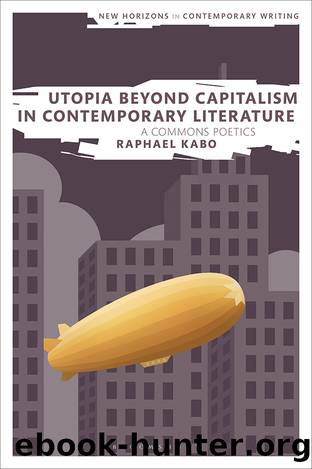Utopia Beyond Capitalism in Contemporary Literature by Raphael Kabo;

Author:Raphael Kabo; [Kabo;, Raphael]
Language: eng
Format: epub
Tags: TBU, CLEAN
ISBN: 9781350288577
Publisher: Bloomsbury UK
Published: 0101-01-01T00:00:00+00:00
Figure 1 Harry Pettit, âThe Cosmopolis of the Futureâ from Kingâs Views of New York (New York: Moses King, 1908). Image courtesy of The Skyscraper Museum.
New York 2140âs relationship to dystopia is nonetheless more nuanced than Levitas makes out. Adeline Johns-Putra argues that since it is âmore accurate to identify climate change as a topic found in many genresâ, including dystopia, and because growing scientific consensus on the ongoing and emerging effects of climate change paints a distinctly un-rosy picture of the future, many texts in the recent groundswell of climate change fiction can be âcategorized as dystopian ⦠or postapocalypticâ.27 While critics including Baccolini, Lyman Tower Sargent and Moylan have identified a trajectory of âcritical dystopiasâ in speculative literature since the 1980s, Moylan goes to the heart of the distinction between (critical) dystopia as a genre on one hand and literature with dystopian elements on the other when he writes: âFormally and politically, therefore, the dystopian text refuses a functionalist or reformist perspective. In its purview, no single policy or practice can be isolated as the root problem, no single aberration can be privileged as the one to be fixed so that life in the enclosed status quo can easily resume.â28 From its didactic first pages, and then through the expostulations of the opinionated Citizen narrator, New York 2140 repeatedly and consistently fails this litmus test: the root cause of all the ills of its fictional world is capitalism; the close association of the future world with our present world suggests that these ills can already be resisted now; and finally, a system-overthrowing revolution is the obvious and ultimately achievable cure.
The world of a dystopia must be depicted as measurably worse than the world of its author. New York 2140 fails this test too, depicting instead a world which is both much worse and much better than ours. Although the socially liberal cast of characters may have something to do with it, New York in 2140 appears relatively free from racism, classism, sexism and other forms of overt discrimination; this point is underscored by the universal respect afforded to Gen Octaviasdottir, a Black female Inspector in the New York City Police Department.29 Even the stockbroker Frank, by far the most bigoted member of the cast, quickly becomes more respectful and open-minded as he spends more time with the others, and eventually ends up falling in love with the radical leftist organizer âRedâ Charlotte Armstrong. Frank and Charlotteâs relationship is political as much as it is intimate. Their union symbolizes the formation of a new, utopian unity between the social revolutionary tactics proposed by Charlotte which, in the end, involve her exposing the criminal activity of the chairman of the Federal Reserve and calling for a national rent strike, and Frankâs intuitive understanding of neoliberal finance, which allows him to effectively manipulate the system from the inside, accelerating the effects of Charlotteâs activity. Other utopian elements in Robinsonâs world highlight the importance of management, maintenance and âstaying with the troubleâ
Download
This site does not store any files on its server. We only index and link to content provided by other sites. Please contact the content providers to delete copyright contents if any and email us, we'll remove relevant links or contents immediately.
4 3 2 1: A Novel by Paul Auster(11074)
The handmaid's tale by Margaret Atwood(6874)
Giovanni's Room by James Baldwin(5896)
Big Magic: Creative Living Beyond Fear by Elizabeth Gilbert(4734)
Asking the Right Questions: A Guide to Critical Thinking by M. Neil Browne & Stuart M. Keeley(4599)
On Writing A Memoir of the Craft by Stephen King(4221)
Ego Is the Enemy by Ryan Holiday(4002)
Ken Follett - World without end by Ken Follett(3981)
The Body: A Guide for Occupants by Bill Bryson(3816)
Bluets by Maggie Nelson(3722)
Adulting by Kelly Williams Brown(3681)
Guilty Pleasures by Laurell K Hamilton(3600)
Eat That Frog! by Brian Tracy(3525)
White Noise - A Novel by Don DeLillo(3443)
The Poetry of Pablo Neruda by Pablo Neruda(3371)
Alive: The Story of the Andes Survivors by Piers Paul Read(3320)
The Bookshop by Penelope Fitzgerald(3237)
The Book of Joy by Dalai Lama(3234)
Fingerprints of the Gods by Graham Hancock(3223)
